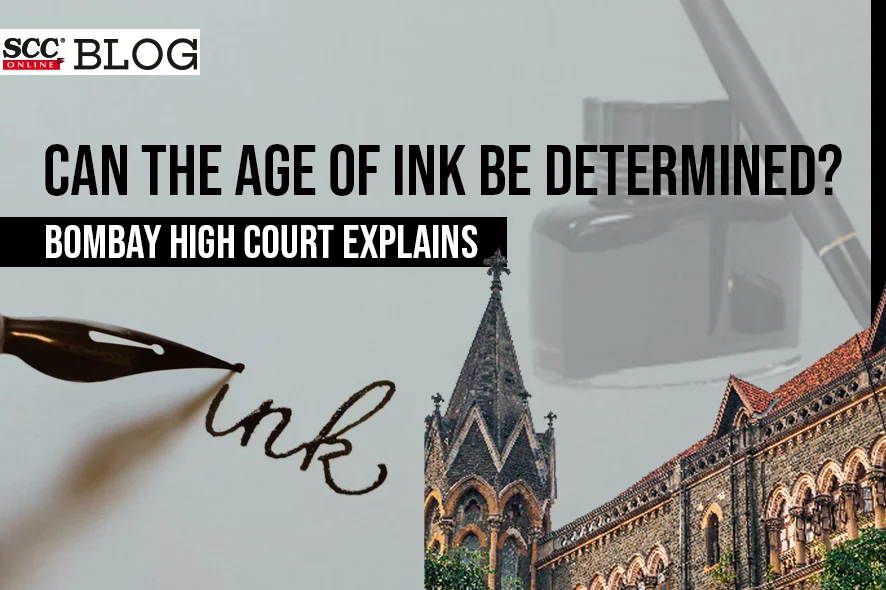Bombay High Court: In a petition assailing order dated 21-06-2023 passed by the Sessions Court quashing and setting aside the Trial Court order wherein, the Magistrate had rejected the application filed by the accused seeking to appoint handwriting expert for ink age test of the disputed cheque, Anil L. Pansare, J. restored the Trial Court’s decision with reference to a Madras High Court’s decision wherein a Forensic Expert clarified that there was no concrete scientific test for determining the age of ink.
Litigation Trajectory
The said application was rejected by the Magistrate while placing reliance upon Rajasthan High Court’s decision in Manish Singh v. Jeetendra Meena, 2018 SCC OnLine Raj 3067 which in turn had referred to Supreme Court’s judgment in Union of India v. Jyoti Prakash Mitter, (1971) 1 SCC 396 and held that “there is no mechanism to determine the age of the ink. The expert opinion to check age of the ink cannot help to determine the date of writing of the document because the ink used in the writing of the document may have been manufactured years earlier.”
The Sessions Court while dealing with the revision ‘recognized and considered the aforesaid judgment’ but took an exception to the Magistrate’s order with the explanation that “accused has right to get satisfactory opportunity to defend his case” with the view that the doubt on accuracy of scientific test to determine ink cannot prevent the accused from taking the chance of a scientific test for determining age of ink in writing by handwriting expert.
Factual Background
The respondent version reflected that he issued a signed blank cheque on 5-01-2010 as a security in favour of the petitioner, who misused the said cheque by filling up the contents in the cheque in 2016. This fact led him to file an application before the Trial Court seeking to ascertain the age of ink.
Court’s Analysis of Ink Age Determination
While considering the contention that “accused has a right to fair trial and has a right to defend himself and for that purpose to adduce evidence in terms of sub section (2) of Section 243 of the Criminal Procedure Code, 1973” while relying upon T. Nagappa v. Y.R. Muralidhar, (2008) 5 SCC 633, the Court acknowledged and accepted the said proposition of law. However, the Court expressed that “where the exercise is found to be undertaken in futility, the Courts below will have to be vigilant in entertaining the applications which, even if allowed, has a sealed fate.” It went on to point towards the said Rajasthan High Court Judge after reference to various Courts’ judgments to accept the absence of availability of any accurate scientific test for determining the age of ink.
The Court went on to enquire on the existence of any scientific laboratory for conducting such chemical test for accurate ascertainment of age of the ink, which was said to be available at BARC. The Court referred to Madras High Court’s decision in Kanagaraj v. Ramamoorthy (C.R.P. (MD) No.601/2021 and C.M.P. (MD) No.3344/2021) with reference to R. Jagadeesan v. N. Ayyasamy, 2010 SCC OnLine Mad 562 wherein, BARC’s test for determination of age was discussed, which was also clearly and unambiguously stated not to be accurate by the Head of the Department of Forensic Science of Chennai and regarded the said practice of sending documents to the Forensic Department for determining age of writings as futile.
Can the age of ink be determined? – Conclusion
The Court opined that with the said position, there was no justification to take up a futile attempt to find out the age of ink on instrument under question. It further stated that such an exercise would not yield any benefit to either party based on the expert opinion recorded in R. Jagadeesan (supra). The Sessions Court, in the Court’s opinion committed an error in reversing the Trial Court’s decision, and therefore quashed and set aside the impugned judgment and order and restored the Trial Court’s order dated 13-12-2022.
[Dhyaneshwar Eknath Gulhane v. Vinod Ramchandra Lokhande, 2023 SCC OnLine Bom 2431, decided on 2-11-2023]
Judgment authored by: Justice G.S. Sandhawalia
Advocates who appeared in this case :
For Petitioners: Advocate N.R. Shiralkar
For Respondents: Advocate S. G. Joshi








